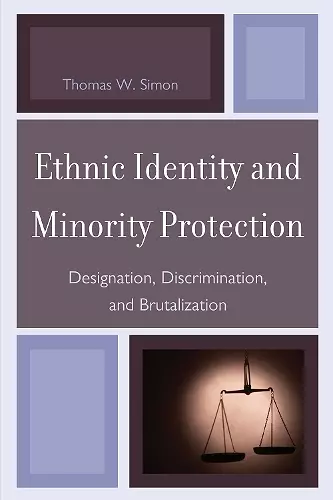Ethnic Identity and Minority Protection
Designation, Discrimination, and Brutalization
Format:Paperback
Publisher:Lexington Books
Published:6th Dec '13
Currently unavailable, and unfortunately no date known when it will be back

In Ethnic Identity and Minority Protection: Designation, Discrimination, and Brutalization, Thomas W. Simon examines a new framework for considering ethnic conflicts. In contrast to the more traditional theories of justice, Simon’s theory of injustice shifts focus away from group identity toward group harms, effectively making many problems, such as how to define minorities in international law, dramatically more manageable. Simon argues that instead of promoting legislative devices like proportional representation for minorities, it is more fruitful to seek adjudicative solutions to racial and ethnic-related conflicts. For example, resources could be shifted to quasi-judicial human-rights treaty bodies that have adopted an injustice approach. This injustice approach provides the foundation for Kosovo’s case for remedial secession, and helps to sort out the competing entitlement claims of Malays in different countries. Indeed, the priority of Thomas W. Simon’s Ethnic Identity and Minority Protection is to ensure the tales of designation and discrimination told at the beginning of the work do not become the stories of brutalization told at the end. In short, the challenge tackled in this text is to assure that reason reigns over hate.
In Ethnic Identity and Minority Protection: From Designation to Brutalization, Thomas Simon takes his stand with those philosophers who call for giving priority to identifying and removing injustices over formulating and implementing standards of justice. Simon addresses problems that have only recently started to attract the attention of philosophers, and he shows that that attention is needed and overdue. In a discussion rich in examples from recent history, current events, and the author’s own personal experiences, Simon reflects on the lamentable harms imposed on a wide range of disadvantaged groups, ethnic, racial, national, and political. Going beyond familiar designations, he finds troubling aspects regarding groupings that are rarely seen as problematic, e.g., citizens. Simon takes a hard and critical look at the institutions currently tasked with protecting groups against injustice, and explores their failures. He argues for greater recourse to judicial solutions because of courts’ ability to protect minorities from majority oppression. He catalogues the shortcomings of numerous United Nations organizations, but points as well to the successes of the U.N. Committee on the Elimination of Racial Discrimination. This book combines passion and argument, moving narratives and insightful philosophical and legal analysis. It identifies problems and defends solutions. It could sensitize readers to the way groups are seen and the way they are treated. It might well contribute to a reduction in the targeting of groups for violence and abuse. -- Jeffrey Reiman, American University; coauthor of The Rich Get Richer and the Poor Get Prison
A very powerful book! This is political philosophy as it should be taught, written, and practiced. -- James P. Sterba, professor, University of Notre Dame
[Tom Simon] has written an excellent and very readable book. I find myself in agreement with practically all of his arguments. The book is full of excellent and informative examples of minority group harm. . . . I found this book to be extremely well written and argued. And it provides many interesting examples of the issues Simon discusses. I heartily recommend this book for both a classroom text and personal enlightenment. * Journal of Agricultural and Environmental Ethics *
ISBN: 9780739149812
Dimensions: 229mm x 153mm x 25mm
Weight: 494g
330 pages